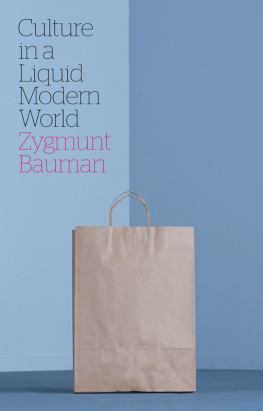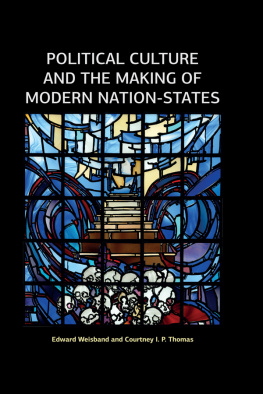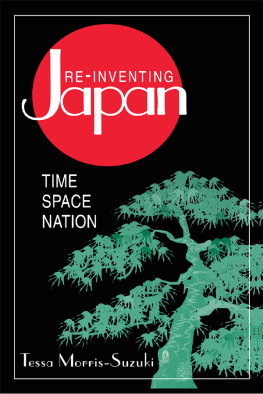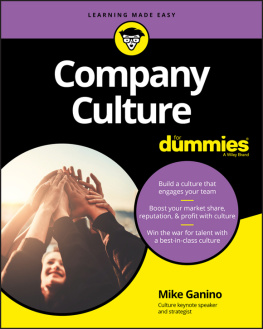Bauman Lydia - Culture in a Liquid Modern World
Here you can read online Bauman Lydia - Culture in a Liquid Modern World full text of the book (entire story) in english for free. Download pdf and epub, get meaning, cover and reviews about this ebook. City: Oxford, year: 2013, publisher: Wiley, genre: Politics. Description of the work, (preface) as well as reviews are available. Best literature library LitArk.com created for fans of good reading and offers a wide selection of genres:
Romance novel
Science fiction
Adventure
Detective
Science
History
Home and family
Prose
Art
Politics
Computer
Non-fiction
Religion
Business
Children
Humor
Choose a favorite category and find really read worthwhile books. Enjoy immersion in the world of imagination, feel the emotions of the characters or learn something new for yourself, make an fascinating discovery.
- Book:Culture in a Liquid Modern World
- Author:
- Publisher:Wiley
- Genre:
- Year:2013
- City:Oxford
- Rating:3 / 5
- Favourites:Add to favourites
- Your mark:
- 60
- 1
- 2
- 3
- 4
- 5
Culture in a Liquid Modern World: summary, description and annotation
We offer to read an annotation, description, summary or preface (depends on what the author of the book "Culture in a Liquid Modern World" wrote himself). If you haven't found the necessary information about the book — write in the comments, we will try to find it.
Culture in a Liquid Modern World — read online for free the complete book (whole text) full work
Below is the text of the book, divided by pages. System saving the place of the last page read, allows you to conveniently read the book "Culture in a Liquid Modern World" online for free, without having to search again every time where you left off. Put a bookmark, and you can go to the page where you finished reading at any time.
Font size:
Interval:
Bookmark:
Culture in a Liquid Modern World

Culture in a Liquid Modern World

Zygmunt Bauman
Translated (from Polish) by Lydia Bauman
polity
in association with the National Audiovisual Institute
Copyright Zygmunt Bauman 2011
The right of Zygmunt Bauman to be identified as Author of this Work has been asserted in accordance with the UK Copyright, Designs and Patents Act 1988.
First published in 2011 by Polity Press
Polity Press
65 Bridge Street
Cambridge CB2 1UR, UK
Polity Press
350 Main Street
Malden, MA 02148, USA
All rights reserved. Except for the quotation of short passages for the purpose of criticism and review, no part of this publication may be reproduced, stored in a retrieval system, or transmitted, in any form or by any means, electronic, mechanical, photocopying, recording or otherwise, without the prior permission of the publisher.
ISBN-13: 978-0-7456-3716-7
A catalogue record for this book is available from the British Library.
Typeset in 11 on 14 pt Sabon
by Servis Filmsetting Ltd, Stockport, Cheshire
Printed and bound by MPG Books Group, UK
The publisher has used its best endeavours to ensure that the URLs for external websites referred to in this book are correct and active at the time of going to press. However, the publisher has no responsibility for the websites and can make no guarantee that a site will remain live or that the content is or will remain appropriate.
Every effort has been made to trace all copyright holders, but if any have been inadvertently overlooked the publisher will be pleased to include any necessary credits in any subsequent reprint or edition.
For further information on Polity, visit our website: www.politybooks.com
This book was commissioned by the National Audiovisual Institute for the European Culture Congress, 811 September 2011, Wrocaw, Poland.

www.nina.gov.pl

www.culturecongress.eu
Some notes on the historical peregrinations of the concept of Culture
On the basis of findings made in Great Britain, Chile, Hungary, Israel and Holland, a thirteen-strong team led by the highly respected Oxford sociologist John Goldthorpe concluded that a cultural elite can no longer be readily distinguished from those lower in the cultural hierarchy by the old signs: regular attendance at the opera and concerts, an enthusiasm for everything regarded as high art at any given moment, and a habit of turning up its nose at all that is common, like a pop song, or mainstream television. Which is not at all to say that one does not still come across those who are regarded, not least by themselves, as the cultural elite, true art lovers, people better informed than their not quite so cultured peers as to what culture is about, what it consists of and what is deemed Comme il faut or comme il ne faut pas what is suitable or not suitable for a man or woman of culture. Except that, unlike those latter-day cultural elites, they are not connoisseurs in the strict sense of the word, looking down on the taste of the common man, or the tastelessness of the philistine. Rather, it is more appropriate today to describe them using the term coined by Richard A Petersen, of Vanderbilt University as omnivorous: there is room in their repertory of cultural consumption for both opera and heavy metal or punk, for high art and mainstream television, for Samuel Beckett and Terry Pratchett. A bite of this, a morsel of that, this today, tomorrow something else. A mixture according to Stephen Fry, authority on modish trends and shining light of the most exclusive London society (as well as star of some of the most popular TV shows). He publicly admits:
Well, people can be dippy about all things digital and still read books, they can go to the opera and watch a cricket match and apply for Led Zeppelin tickets without splitting themselves asunder You like Thai food? But what is wrong with Italian? Woah, there calm down. I like both. Yes. It can be done. I can like rugby football and the musicals of Stephen Sondheim. High Victorian Gothic and the installations of Damien Hirst. Herb Alperts Tijuana Brass and piano works of Hindemith. English hymns and Richard Dawkins. First editions of Norman Douglas and iPods, snooker, darts, and ballet
Or, as Petersen put it in 2005, summing up twenty years of inquiry: We see a shift in elite status group politics from those highbrows who snobbishly disdain all base, vulgar, or mass popular culture to those highbrows who omnivorously consume a wide range of popular as well as highbrow art forms In other words no works of culture are alien to me: I dont identify with any of them a hundred per cent, totally and absolutely, and certainly not at the price of denying myself other pleasures. I feel at home everywhere, despite the fact (or perhaps because of it) that there is no place I can call home. It isnt so much a confrontation of one (refined) taste against another (vulgar) one, but of omnivorousness against univorousness, a readiness to consume everything against finicky selectiveness. The cultural elite is alive and kicking; it is today more active and eager than ever before but it is too preoccupied with tracking hits and other celebrated culture-related events to find time for formulating canons of faith, or converting others to them.
Apart from the principle of dont be fussy, dont be choosy and consume more, it has nothing to say to the univorous throng at the bottom of the cultural hierarchy.
And yet, as Pierre Bourdieu maintained only a few decades ago, every artistic offering used to be addressed to a specific social class, and to that class alone and was accepted only, or primarily by that class. The triple effect of those artistic offerings class definition, class segregation and manifestation of class membership was, according to Bourdieu, their essential raison d-tre, the most important of their social functions, perhaps even their hidden, if not their professed aim.
According to Bourdieu, works of art intended for aesthetic consumption pointed out, signalled and protected class divisions, legibly marking and fortifying interclass boundaries. In order to unequivocally mark boundaries and to protect them effectively, all objets dart, or at least a significant majority, had to be assigned to mutually exclusive sets; sets whose contents were not to be mixed, or approved of or possessed simultaneously. What counted were not so much their contents or innate qualities as their differences, their mutual intolerance and a ban on their conciliation, erroneously presented as a manifestation of their innate, immanent resistance to morganatic relationships. There were elite tastes, high culture by nature, average or philistine tastes typical of the middle class, and vulgar tastes, worshipped by the lower class and it was no easier to mix them with than fire and water. It may be that nature abhors a vacuum, but culture definitely does not tolerate a mlange. In Bourdieus Distinction, culture manifested itself above all as a useful appliance, consciously intended to mark out class differences and to safeguard them: as a technology invented for the creation and protection of class divisions and social hierarchies.
Culture, in short, manifested itself in a form similar to that described a century earlier by Oscar Wilde: Those who find beautiful meanings in beautiful things are the cultivated They are the elect to whom beautiful things mean only Beauty. The elect, chosen ones, that is to say those who sing the glory of those values they themselves uphold, at one and the same time ensuring their own victory in the song contest. Inevitably they will find beautiful meanings in beauty, since it is they who decide what beauty is; even before the search for beauty began, who was it, if not the chosen ones, who decided where to look for that beauty (at the opera, not at the music hall or on the market stall; in galleries, not on city walls or in cheap prints gracing working-class or peasant homes; in leather-bound volumes, not in newsprint or cheap penny-publications). The chosen ones are chosen not by virtue of their insight into what is beautiful, but rather by the fact that the statement this is beautiful is binding precisely because it was uttered by them and confirmed by their actions
Next pageFont size:
Interval:
Bookmark:
Similar books «Culture in a Liquid Modern World»
Look at similar books to Culture in a Liquid Modern World. We have selected literature similar in name and meaning in the hope of providing readers with more options to find new, interesting, not yet read works.
Discussion, reviews of the book Culture in a Liquid Modern World and just readers' own opinions. Leave your comments, write what you think about the work, its meaning or the main characters. Specify what exactly you liked and what you didn't like, and why you think so.









